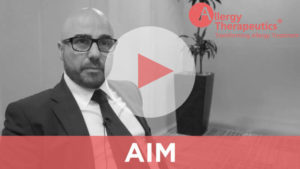Allergy Therapeutics: FDA clearance of IND application for VLP Peanut
Allergy Therapeutics announces FDA clearance of IND application for novel peanut allergy vaccine candidate VLP Peanut
- Paves the way for start of VLP Peanut vaccine candidate’s Phase I PROTECT trial in H1 2022
- Topline data from first-in-human trial expected in H1 2023
- Analysis of data from earlier ex-vivo biomarker study, VLP001, demonstrates beneficial mode of action of the vaccine candidate
Allergy Therapeutics (AIM: AGY), the fully integrated commercial biotechnology company specialising in allergy vaccines, today announces that the United States Food & Drug Administration (FDA) has cleared the Group’s Investigational New Drug application (IND) for its novel virus-like particle (VLP)-based peanut allergy vaccine candidate (“VLP Peanut”).
The clearance by the FDA of the Group’s IND application paves the way for the initiation of the Phase I PROTECT trial which will be run in the United States. The trial will include multiple cohorts beginning with healthy subjects, followed by peanut allergic patients who will undergo skin prick tests, and then peanut allergic patients who will receive subcutaneous injections. The topline data from the Phase I PROTECT trial in adult patients is expected in H1 2023, earlier than the originally intended data readout of Q4 2023.
The potential of an effective short-course peanut allergy vaccine represents a significant opportunity in the $8 billion worldwide food allergy market*. Peanut allergy is one of the most common types of food allergy and its symptoms can range from mild to severe and life-threatening. In the western world, the prevalence of peanut allergy doubled between 2005 and 2015 and it is becoming apparent in Africa and Asia**. Only about 20% of children diagnosed with peanut allergy outgrow it by the time they reach school age. In the US, peanut allergy was the most common cause of severe and fatal food-induced anaphylactic reactions***.
Previously announced primary and secondary data from the VLP001 trial, an ex-vivo biomarker study which took place at Imperial College London, demonstrated a significant 24-fold reduction in basophil activation and histamine release, and reduced IgE binding capacity to B cells, compared to exposure to the major allergen Ara h2. This strongly suggests a promising safety profile with reduced potency to induce allergic reactions.
Analysis of the data also revealed that VLP Peanut has:
- Reduced capacity to induce proliferation of Th2 cells compared to Ara h2 and whole peanut extract.
- The ability to promote IFN- γ and Th1 cells and selected regulatory B cell subsets.
- Demonstrates downregulation of DC2-associated genes.
These data provide strong confidence in the beneficial immunologic mode of action of VLP Peanut – i.e., confirmation of an effective mechanism to promote class switching from the allergic Th2 pathway to the more tolerogenic Th1 pathway.
Manuel Llobet, CEO of Allergy Therapeutics, stated: “We have achieved a key milestone with the FDA’s clearance of our IND application and look forward to advancing our innovative peanut allergy vaccine candidate into the clinic. We are now one step closer to bringing to patients a safe and effective short-course vaccine with the potential to provide long-term protection and a long-lasting protective immune response. I am excited to see the start of the PROTECT trial later this year.”
About VLP Peanut
VLP Peanut is being developed as a novel VLP-based therapy for the treatment of peanut allergy. This novel immunogenic, protective, and non-reactogenic vaccine candidate is based on immunologically optimised Cucumber Mosaic Virus-derived VLPs (CuMVTT) with the major peanut allergen (Arachis hypogaea) (Ara h2) displayed on its surface. Patents behind the technology to treat peanut allergy with VLP Peanut have been granted in the US and are at the national phase in other territories.
References
* The Journal of Allergy and Clinical Immunology 2016. 1% of US population. EACCI Food Allergy and Anaphylaxis Guidelines Group 2016 0.2% of Western European Population. Management assumption of annual treatment of $2k
**Du Toit G, Roberts G, Sayre PH, et al. Randomized trial of peanut consumption in infants at risk for peanut allergy [published correction appears in N Engl J Med. 2016 Jul 28;375(4):398]. N Engl J Med. 2015;372(9):803‐813.
***Sampson H, Shreffler W, Yang W, Sussman G, Brown-Whitehorn T, Nadeau K et al. Effect of Varying Doses of Epicutaneous Immunotherapy vs Placebo on Reaction to Peanut Protein Exposure Among Patients With Peanut Sensitivity. JAMA. 2017; 318 (18):1798.
In the short interview below, Manuel Llobet & Nick Wykeman, CEO & CFO respectively, provide highlights from the Group’s recent financial results, in the context of the Company’s three pronged strategy, growing the EU business, entering the US market and developing their pipeline

